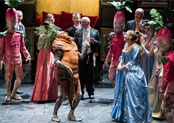OPERA SEARCH

Le Roi Carotte (OEK critical edition)
(1871-72)Libretto by Victorien Sardou; German version by Jean Abel (F)
2S,2M,2T; minor roles; mixed chorus;
2(II=picc).2.2.2-2.2.3.0-timp.perc:TD/tgl/BD/cym/bell-strings
Abbreviations (PDF)
Bote & Bock
Théâtre de la Gaîté, Paris
Company: Zulma Bouffar, Anna Judic, Seveste, Masset, Aurèle, Vicini
| ROBIN-LURON, a spirit | Mezzo-Soprano |
| ROSÉE-DU-SOIR | Lyric Soprano |
| Princess CUNÉGONDE | Mezzo-Soprano |
| COLOQUINTE, witch / CORINNE, courtesan | speaking role (also from chorus) |
| CHRISTIANE, student / The Maréchale TRAC / MÉDULLA, attendant to Corinne / She-Ant aide-de-camp | Soubrette |
| The Countess SCHOPP / LÉPIDA, bride / First Butterfly | Lyric Soprano or Mezzo-Soprano |
| The Baroness KOFFRE / DRUSILLE, rioter / First She-Butterfly | Soubrette |
| Madam PIPERTRUNCK | Lyric Soprano or Mezzo-Soprano |
| YPHIS, slave; Queen of the bees; First and Second Ant; The Echo | small roles / soli from chorus |
| Prince FRIDOLIN XXIV of Krokodyne | Young Heroic Tenor |
| LE ROI CAROTTE (King Carrot) | Buffo-Tenor |
| PIPERTRUNCK, chief of the police | Buffo-Bass |
| TRUCK, court-necromancer | High Lyric Baritone |
| Maréchal TRAC, minister of war / GURGÈS, a dandy | Buffo-Tenor |
| Baron KOFFRE, Grand-Treasurer / CHOSROËS, persian | Buffo-Tenor |
| LADISLAS, student / QUIRIBIBI, magician | Character Baritone |
| Count SCHOPP, counselor / PYRGOPOLYNICE, soldier | Buffo-Bass |
| PSITT, chamberlain / GRAND-CLAUDE, peasant / CARION / Secretary | Baritone |
| TRAUGOTT, peasant / OTTOCAR, inn-keeper / PANSA, aedile / Brigadier | High Baritone |
| CURCULION, parasite; MÉGADORE, poet; HARPAX, gladiator; HISTRION, ham; herald; policeman | small roles / soli from chorus |
| People, soliders, students, court, suits of armour, retinue of vegetables, Pompeians, insects, monkeys | Chorus |
Prince Fridolin is a lousy sovereign, seeking nothing but amusement. The treasury is empty. A marriage with Princess Cunégonde from the neighbouring kingdom shall release him from this precarious situation. He cherishes hopes for a dowry, but will only marry her if he takes a liking to her. Robin-Luron, a good spirit with magic powers who first comes into play disguised as a student, wants to get him back on the straight and narrow and make him a good regent. His opponent is the evil witch Coloquinte who was humiliated by Fridolin’s ancestors and has therefore set her mind on getting rid of Fridolin as the kingdom’s ruler. In the tower of the old royal palace she holds captive Rosée-du-soir, a count’s daughter, and makes her work as her servant. Rosée is desperately in love with Prince Fridolin.
In order to get to the bottom of Princess Cunégonde’s true nature, Fridolin appears incognito for their first encounter. Being a man-about-town himself, he is enchanted by the unashamed and worldly manners of the lady. He informs his cabinet – consisting of good-for-nothing necromancer Truck, chief of police Pipertrunck, treasurer baron Koffre and a few others – that he will marry the princess even though she comes without the desired endowment. A festive reception in her honour finds a sudden end by the entrance of King Carrot and his entourage of various vegetables. Coloquinte has brought the royal garden’s vegetables to life. By means of deliberate confusion King Carot dethrones the prince and expels him from town. Fridolin’s forefathers’ suits of armour which have been sold inconsiderately by the young regent also suddenly spring to life and take vengeance for his lack of respect by putting a curse on him. In the meantime, Rosée-du-soir has escaped from her prison with the help of Robin-Luron. Dressed up as a young fellow she follows Fridolin and lets herself be hired as a knave.
The most helpful piece of advice for Fridolin comes from Quiribibi, an ancient wizard. If Fridolin can manage to come into possession of King Solomon’s ring, there is still hope for him. In search of it, the prince and his few loyal companions get to ancient Pompeii by means of time travel – and onwards to an underground ant colony, into the realm of insects and a Caribbean monkey island. There he recognizes Rosée-du-soir’s true identity, falls passionately in love with her and vows to prove himself worthy of her.
Meanwhile, King Carrot’s good days on earth are numbered. He has proven to be an even worse sovereign than Fridolin. He is withering away. The town’s citizens stir up a revolution against him. However, the witch Coloquinte reassures him: No human hand could ever take him off the throne. But Robin-Luron interferes with her plan by bringing a monkey into play. With his help, the witch, King Carrot and all of his vegetable court are banished back below ground. Prince Fridolin returns as a better human being, takes his rightful throne and marries Rosée-du-soir.
"Roi Carotte is a clear step in the direction of Tales of Hoffmann… a valuable Offenbach work has been reclaimed for the theatre in Lyon. It was greeted by thunderous applause and huge enthusiasm."
Deutsche Bühne
"A masterpiece – the word is no exaggeration – as Offenbach’s imagination here reaches for the summit, constantly renewing itself through eleven tableaux to suit the numerous choruses and ensembles swept up in the epic spirit, from the apocalyptic eruption of Vesuvius, a hilarious ode to the railway, or a shiny parade of ants, to the scene at the barricades that may recall the horrors of the Commune… The production is a celebration always supported by humour, perfectly timed, leading up to the appearance of a giant food mill. You can imagine how King Carrot ends up – as purée – what a triumph."
Diapason
Comic
